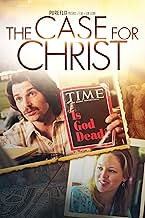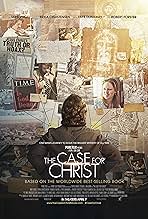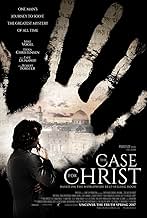IMDb RATING
6.4/10
11K
YOUR RATING
An investigative journalist and self-proclaimed atheist sets out to disprove the existence of God after his wife becomes a Christian.An investigative journalist and self-proclaimed atheist sets out to disprove the existence of God after his wife becomes a Christian.An investigative journalist and self-proclaimed atheist sets out to disprove the existence of God after his wife becomes a Christian.
- Awards
- 4 nominations total
Matthew Brenher
- Dr. Phillip Singer
- (as Matthew Brehner)
Mark Campbell
- Judge
- (as Mark Alan Campbell)
Mandy Grace
- Nurse
- (voice)
- Director
- Writers
- All cast & crew
- Production, box office & more at IMDbPro
Featured reviews
This is a decent movie. It's well directed and well acted. It looks great and it's intense and suspenseful and interesting. I'm an atheist and I find the film surprising
This movie never gets out of the circus maximus tent.
It's as if the journalist decided to explore mathematics except they forgot something.
They go to the chalk board, in an attempt to prove '1' exists.
So they just write 1 1 1 1 1 1 1
OVER and OVER on the chalk board.
And yet ? somehow ?
This clown suit vacant of the clown ?
forgets to even DARE explore the beauty of ZERO.
Save yourself the trip - maybe stop off and visit Scientology? or a local Catholic Church ? same difference, only one I see is - Hubbard KNEW the only tax haven was through religion, most other families with 23 billion or more ? have family become senators to lower those taxes.
The only TAX you'll pay watching THIS film
is your OWN IGNORANCE TO EVER have brought it before your retina.
Me? I would have LOVED to just gone for a former Charlie's Angel's Kate Jackson flick on Lifetime - probably would have been more rewarding too !
It's as if the journalist decided to explore mathematics except they forgot something.
They go to the chalk board, in an attempt to prove '1' exists.
So they just write 1 1 1 1 1 1 1
OVER and OVER on the chalk board.
And yet ? somehow ?
This clown suit vacant of the clown ?
forgets to even DARE explore the beauty of ZERO.
Save yourself the trip - maybe stop off and visit Scientology? or a local Catholic Church ? same difference, only one I see is - Hubbard KNEW the only tax haven was through religion, most other families with 23 billion or more ? have family become senators to lower those taxes.
The only TAX you'll pay watching THIS film
is your OWN IGNORANCE TO EVER have brought it before your retina.
Me? I would have LOVED to just gone for a former Charlie's Angel's Kate Jackson flick on Lifetime - probably would have been more rewarding too !
"Christian" movies have a reputation of being artificial, unprofessional, and only appealing to those who are already indoctrinated. "The Case for Christ" breaks these stereotypes, delivering the best piece of Christian filmography that I've seen, as well as a good biographical drama by more general standards.
As mentioned, "The Case" avoids the pitfalls that the majority of Christian films fall into. It does not vilify atheists, make Christians appear impossibly pious, stuff the script with corny and unnatural dialogue (or significantly lack any other production quality), or contrive situations in order to "prove" Christianity (this is a biography, after all).
While the primary character, Lee Strobel, isn't a very nice person for most of the movie, he is no more flawed than most protagonists, and these flaws are never blamed on atheism, per se. Mike Vogel's portrayal of a man doing what he feels is best for his family and dealing with life's stresses, especially those that come from having one's worldview challenged, is genuine and moving.
I don't think many folks will come into the movie theater as skeptics and walk out as Christians, but I think the movie's producers were mature enough that that's not what they were intending or expecting. The movie likely won't answer all of a skeptic's questions (though the questions they do address are relevant, not straw men), but it answers enough of them that they should realize that (some) people do indeed have reasons for their beliefs.
Altogether, Christians and non-Christians alike should walk away from this movie with the desire to learn more, and they'll have experienced a good piece of cinema in the process.
As mentioned, "The Case" avoids the pitfalls that the majority of Christian films fall into. It does not vilify atheists, make Christians appear impossibly pious, stuff the script with corny and unnatural dialogue (or significantly lack any other production quality), or contrive situations in order to "prove" Christianity (this is a biography, after all).
While the primary character, Lee Strobel, isn't a very nice person for most of the movie, he is no more flawed than most protagonists, and these flaws are never blamed on atheism, per se. Mike Vogel's portrayal of a man doing what he feels is best for his family and dealing with life's stresses, especially those that come from having one's worldview challenged, is genuine and moving.
I don't think many folks will come into the movie theater as skeptics and walk out as Christians, but I think the movie's producers were mature enough that that's not what they were intending or expecting. The movie likely won't answer all of a skeptic's questions (though the questions they do address are relevant, not straw men), but it answers enough of them that they should realize that (some) people do indeed have reasons for their beliefs.
Altogether, Christians and non-Christians alike should walk away from this movie with the desire to learn more, and they'll have experienced a good piece of cinema in the process.
I get Lee Strobel in a way that many of the reviewers of this obviously don't. At least in the sense that I, too, was an outspoken atheist who became convinced about the reality of the resurrection. Having become a Christian I later became a pastor. I'm not a fundamentalist. I generally disdain adjectives that serve little purpose other than to divide Christians into competing groups, but if I was forced to pick one I'd say that I probably lean toward the more progressive side of the Christian faith and have an open mind toward Christian universalism, although I'm not convinced of it. But I'm not here to shill for the Christian faith or to proselytize. I'm just here to review a movie. Lee Strobel's story interests me for obvious reasons. As a journalist he was bothered by his wife's sudden conversion to Christian faith and essentially set out to collect evidence that would debunk the Christian faith. Instead, the evidence he collected convinced him of the truth of the Christian faith. As a summary of Strobel's faith journey, I thought this was interesting and well portrayed, and Mike Vogel did a good job as Strobel, as did Erika Christensen as his wife Leslie.
I'm not convinced that this movie would convince anyone to believe. Nor am I convinced that the purpose of this movie was to convince anyone to believe. I think the purpose of the movie was to simply portray Strobel's own journey. How did this atheist turn around and become a man of faith? So, really, this is what I'd call a "niche" movie. It will be of interest to Christians - evangelicals who like stories of conversions and people like myself who can understand Strobel's journey. So negative reviews that are based on not being convinced by the evidence Strobel presents are missing the point. That's legitimate reason to dismiss the book (of the same name) that Strobel wrote - which did have an evangelical agenda - but as far as this movie is concerned all that really matters is that Strobel found evidence that convinced him, not whether that evidence would convince anyone else. He did, and the story is well presented.
My own journey was different. Although I believe there's more than enough evidence to support the basic tenets of the Christian faith (including concepts such as resurrection and incarnation) I readily accept that the evidence is circumstantial and subjective. The evidence can point one in a particular direction, but somewhere along the way there has to be an experiential element to a conversion that actually convinces a person to believe. Faith, after all, is indeed belief in that which cannot be proven. And the movie did make a valid point - that both belief in God and unbelief in God is really a matter of faith, since the existence of God can be neither proven nor disproven. It is by its very nature a matter of faith.
This is a surprisingly decent movie. There's a bit of a backstory about some of Strobel's work as an investigative journalist trying to uncover police corruption in Chicago, but mostly it's a Christian movie about the search for truth. It won't "convince" anyone - but it will provide an interesting enough account of one man's spiritual journey from atheism to Christianity. (7/10)
I'm not convinced that this movie would convince anyone to believe. Nor am I convinced that the purpose of this movie was to convince anyone to believe. I think the purpose of the movie was to simply portray Strobel's own journey. How did this atheist turn around and become a man of faith? So, really, this is what I'd call a "niche" movie. It will be of interest to Christians - evangelicals who like stories of conversions and people like myself who can understand Strobel's journey. So negative reviews that are based on not being convinced by the evidence Strobel presents are missing the point. That's legitimate reason to dismiss the book (of the same name) that Strobel wrote - which did have an evangelical agenda - but as far as this movie is concerned all that really matters is that Strobel found evidence that convinced him, not whether that evidence would convince anyone else. He did, and the story is well presented.
My own journey was different. Although I believe there's more than enough evidence to support the basic tenets of the Christian faith (including concepts such as resurrection and incarnation) I readily accept that the evidence is circumstantial and subjective. The evidence can point one in a particular direction, but somewhere along the way there has to be an experiential element to a conversion that actually convinces a person to believe. Faith, after all, is indeed belief in that which cannot be proven. And the movie did make a valid point - that both belief in God and unbelief in God is really a matter of faith, since the existence of God can be neither proven nor disproven. It is by its very nature a matter of faith.
This is a surprisingly decent movie. There's a bit of a backstory about some of Strobel's work as an investigative journalist trying to uncover police corruption in Chicago, but mostly it's a Christian movie about the search for truth. It won't "convince" anyone - but it will provide an interesting enough account of one man's spiritual journey from atheism to Christianity. (7/10)
Pure Flix Entertainment is one the most instantaneously recognizable film companies of our time, mainly in this respect: they really, REALLY want God to be real, and they will assure themselves of this position annually with a flicker show or two. If it also turns out they made a good, subtle, realistic, or even well-argued movie in the process of serving as their own confirmation bias, they just got lucky. In certain ways, I suppose this is one instance.
Unlike such Pure Flix productions as God's Not Dead and God's Not Dead 2: We're Still Right, their 2017 piece The Case for Christ is based on a true story, and no, it is not the one with the healed-up lepers. It is about an American atheist and journalist who attempts to disprove the existence of Christ to his very religious wife, only to find that the stuff he learns pushes him more towards the side of faith.
Indeed, Lee Stobel is a real person (played here by Mike Vogel of Cloverfield fame) and he did conduct an investigation that ultimately turned him Christian, which he documents in his similarly titled book from 1998. His Wikipedia article is careful to point out that "The book does not feature any non-evangelical scholarly interviews", which I think is useful information. Of course he addressed counterarguments in later books, though it seems to have taken place after his brain already finished cooking and his mind was made up - not unlike that which his movie counterpart accuses the wife (Erika Christensen) of.
Of course I'm not here to talk about the books themselves, but what they have in common with the film (aside from, y'know, all the content) is that they serve as another bombastic "told ya so" for believers. Just because this one atheist done goof'd (his first mistake was seemingly to believe that the burden of proof in the "Existence of God" debate was somehow on him), doesn't mean all of us are conversions waiting to happen upon cherry-picked interviews, claims that there were witnesses to Christ's rebirth (without solidly proving THAT), and whatever else passed as research during this journey.
I will say this about The Case for Christ: it is the most competently produced "Christian film" I've seen to date. The camera work is decent, the music is also enjoyable, and it benefits especially from the fact that it is based on a source material that features sentences that real humans would say. It isn't just sanctimonious preaching interspersed with contrived attempts to make atheists look vile and in-the-wrong next to the enlightened (usually more attractive) Christians.
Hell (and please don't give me cancer or starve my family for using that term, Father), it isn't even entirely bogus. The evidence for some sort of "historical Jesus Christ" isn't as unconvincing, moot, or flat-out non-existent as the evidence that such a figure existed, came back to life, healed the ill, and somehow looked more like an American hippie than a Middle-Eastern carpenter.
There are some solid supporting performances as well, supplied by Faye Dunaway, Mike Pniewski, Robert Forster, Frankie Faison, L. Scott Caldwell, et cetera. But is any of this enough to save a film that is as ill-conceived as the very idea of trying to meet a burden of proof one does not bear? Perhaps it will be for some. I would propose, however, that an exceptional Pure Flix movie does not an exceptional movie make.
Furthermore, if you're in the same demographic as blasphemous old me, you'll want something as insipid and unintentionally hilarious as God's Not Dead or A Matter of Faith over generic stuff like this any day. As for those of you who were in some way offended by this review: rest assured that you can pray for my enlightenment whilst I pray that you one day learn how "extraordinary claims" work, more reliable ways to study history, and how to operate a light switch.
Unlike such Pure Flix productions as God's Not Dead and God's Not Dead 2: We're Still Right, their 2017 piece The Case for Christ is based on a true story, and no, it is not the one with the healed-up lepers. It is about an American atheist and journalist who attempts to disprove the existence of Christ to his very religious wife, only to find that the stuff he learns pushes him more towards the side of faith.
Indeed, Lee Stobel is a real person (played here by Mike Vogel of Cloverfield fame) and he did conduct an investigation that ultimately turned him Christian, which he documents in his similarly titled book from 1998. His Wikipedia article is careful to point out that "The book does not feature any non-evangelical scholarly interviews", which I think is useful information. Of course he addressed counterarguments in later books, though it seems to have taken place after his brain already finished cooking and his mind was made up - not unlike that which his movie counterpart accuses the wife (Erika Christensen) of.
Of course I'm not here to talk about the books themselves, but what they have in common with the film (aside from, y'know, all the content) is that they serve as another bombastic "told ya so" for believers. Just because this one atheist done goof'd (his first mistake was seemingly to believe that the burden of proof in the "Existence of God" debate was somehow on him), doesn't mean all of us are conversions waiting to happen upon cherry-picked interviews, claims that there were witnesses to Christ's rebirth (without solidly proving THAT), and whatever else passed as research during this journey.
I will say this about The Case for Christ: it is the most competently produced "Christian film" I've seen to date. The camera work is decent, the music is also enjoyable, and it benefits especially from the fact that it is based on a source material that features sentences that real humans would say. It isn't just sanctimonious preaching interspersed with contrived attempts to make atheists look vile and in-the-wrong next to the enlightened (usually more attractive) Christians.
Hell (and please don't give me cancer or starve my family for using that term, Father), it isn't even entirely bogus. The evidence for some sort of "historical Jesus Christ" isn't as unconvincing, moot, or flat-out non-existent as the evidence that such a figure existed, came back to life, healed the ill, and somehow looked more like an American hippie than a Middle-Eastern carpenter.
There are some solid supporting performances as well, supplied by Faye Dunaway, Mike Pniewski, Robert Forster, Frankie Faison, L. Scott Caldwell, et cetera. But is any of this enough to save a film that is as ill-conceived as the very idea of trying to meet a burden of proof one does not bear? Perhaps it will be for some. I would propose, however, that an exceptional Pure Flix movie does not an exceptional movie make.
Furthermore, if you're in the same demographic as blasphemous old me, you'll want something as insipid and unintentionally hilarious as God's Not Dead or A Matter of Faith over generic stuff like this any day. As for those of you who were in some way offended by this review: rest assured that you can pray for my enlightenment whilst I pray that you one day learn how "extraordinary claims" work, more reliable ways to study history, and how to operate a light switch.
Did you know
- TriviaLee Strobel was an award-winning legal editor of The Chicago Tribune.
- GoofsWhile visiting Los Angeles, Lee is given the JAMA article, "On the Physical Death of Christ"; however, this was not published until 1986 -- six years later (JAMA 1986; 255:1455-1463).
- Quotes
Lee Strobel: Lee Strobel- Okay God, you win
- ConnectionsReferenced in Midnight Screenings: The Case for Christ (2017)
- SoundtracksYou Put This Love in My Heart
Written by Keith Gordon Green
Performed by Jacob Sooter
Published by EMI April Music Inc.
- How long is The Case for Christ?Powered by Alexa
Details
Box office
- Budget
- $5,000,000 (estimated)
- Gross US & Canada
- $14,682,684
- Opening weekend US & Canada
- $3,967,885
- Apr 9, 2017
- Gross worldwide
- $18,175,663
- Runtime
- 1h 52m(112 min)
- Color
- Aspect ratio
- 2.35 : 1
Contribute to this page
Suggest an edit or add missing content








































